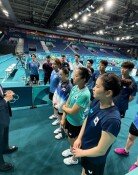Oseas Plant Orders Surge to $10 Billion
Oseas Plant Orders Surge to $10 Billion
Posted April. 02, 2008 06:23,
Overseas factory orders over the past three months have reached a record high of 10 billion U.S. dollars, thanks to surging orders for oil refinery and petrochemical plants from major oil producers.
Certain experts say, however, that Korea should strive to develop more high value-added plants, such as those for liquefied natural gas, if it wants to nurture plant manufacturing as an economic growth engine.
The Knowledge Economy Ministry and the Korea Plant Industries Association said Tuesday that overseas plant orders between January and March reached 11.1 billion dollars, breaking 10 billion dollars in record time.
In 2005, Korea received overseas plant orders worth 15.8 billion dollars, but the figure surged to 25.4 billion dollars in 2006 and 42.2 billion dollars last year. Also in 2005, nine months was needed to break 10 billion dollars in orders, but the period was just six months in 2006 and five months last year.
Plant demand abroad has soared since oil producers, especially Middle Eastern countries, are expanding their industrial infrastructure. Oil producers are also seeing higher demand for offshore plants, including oil-prospecting ships.
Of this years order figure of 11.1 billion dollars, orders for offshore plants took up 5.36 billion dollars, skyrocketing 270 percent from a year go. Those for industrial facilities shot up 350 percent to 1.29 billion dollars.
Unfortunately, orders received by Korean firms have been limited to oil refinery and petrochemical plants. Domestic plant manufacturers have failed to enter the high value-added sector for plants such as those for oil production, oil prospecting and LNG.
Experts say Korean firms are seeing surging demand for low value-added plants since their competitors in more advanced economies like Japan and France have moved on to the high value-added market.
Oil majors control comprehensive resource development projects encompassing oil drilling, production and refinery, but Korean firms have only participated in certain limited processes.
A source from a Korean plant manufacturer said, Instead of being agitated over the amount of orders received, Korea should make an all-out effort to hone its technology and secure qualified talent to nurture the plant industry as a growth engine.
changkim@donga.com







